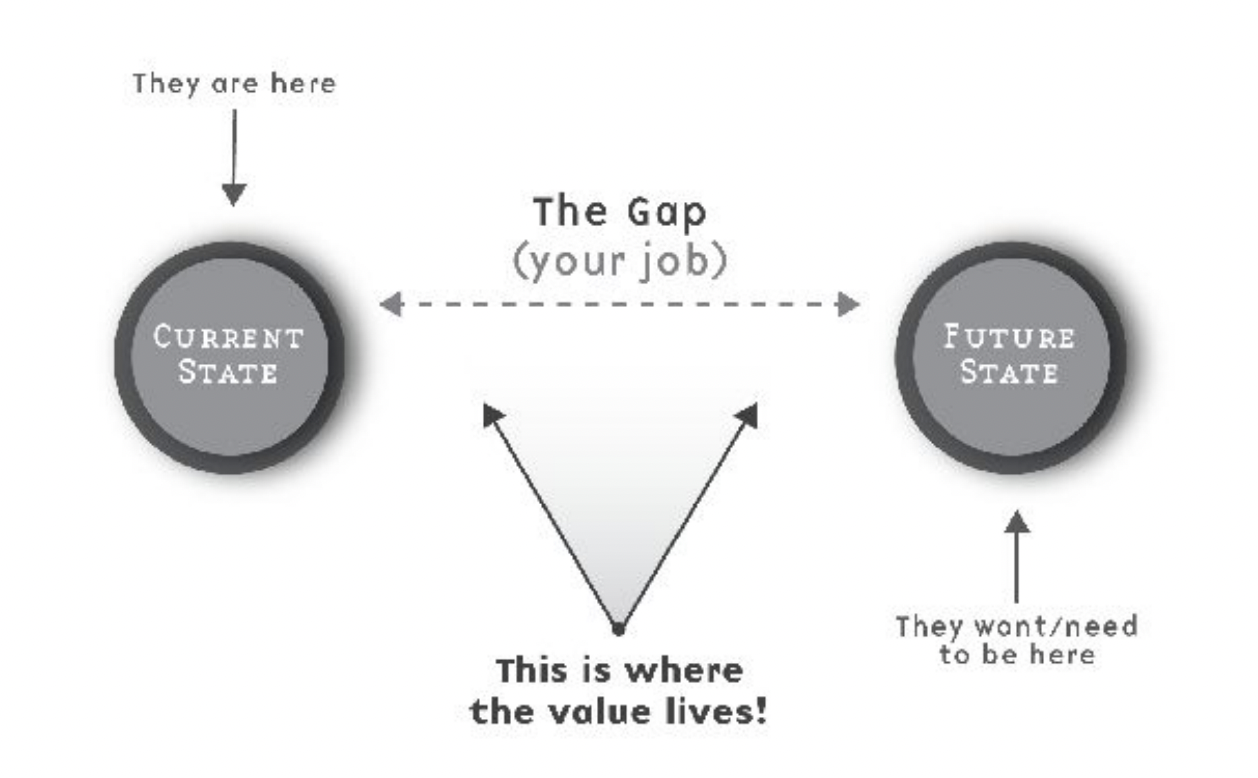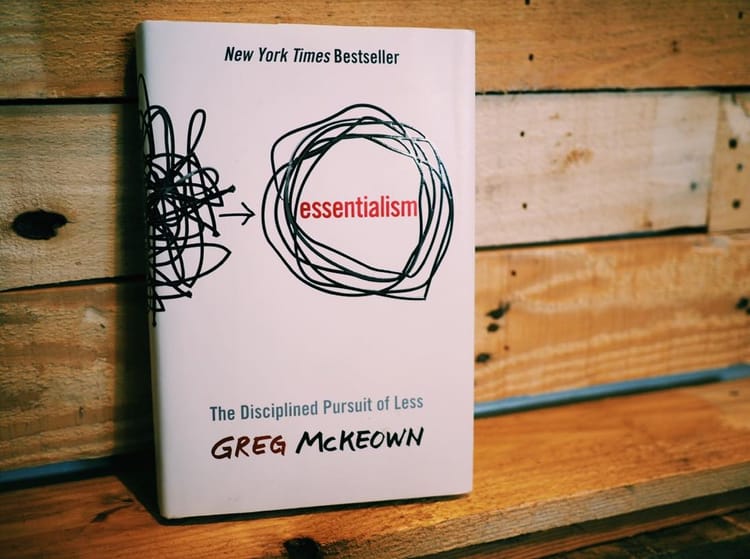Book Review: 'Gap Selling' by Keenan

My career in sales and marketing over fifty years might suggest that there’s little I have to learn about sales. Wrong. I remain fascinated by why and how people buy and the way the concept of sales has evolved.
Many ‘old style’ salespeople struggle with today’s digital world of online and Zoom and in addition, I notice many business owners who still feel uncomfortable when I bring up the subject of their approach to sales. If you identify with either of these two descriptions this book is a must-read (or must-listen on Audible) for all small business owners looking to level up their sales skills.
Gap Selling: A Review and Summary for Small Business Owners
Gap Selling, by renowned sales expert Keenan, offers a fresh and effective approach to sales. For me, it provides a more natural approach, one very different to the way we might have perceived sales in the past.

It’s a sales methodology that focuses on identifying and addressing the "gap" between your customer's current situation and their desired outcome. By understanding this gap and offering solutions that help customers bridge it, you can transform your sales approach, build stronger relationships, and ultimately, help more people and increase your sales.
At the heart of the book is the importance of asking meaningful questions before presenting solutions. When I started in sales, like many others like me, I had to sell and I interpreted that to be that I had to sell/tell people about my product, its features and benefits. Every prospect was the same in my mind and all I had to do was give them 'my pitch'. I was the only one doing the talking and I sucked. No one taught me how to ask intelligent questions.
Questions build trust and create rapport: By asking thoughtful questions, you show your customers that you're genuinely interested in their situation and are willing to invest time and effort to understand their needs. This helps establish trust and rapport, which are essential for building strong, long-lasting relationships with your customers.
Great questions uncover hidden issues that concern them: Customers may not always be forthcoming about their pain points, or they may not even be aware of some of their underlying issues. Asking meaningful questions can help you uncover these hidden pain points, allowing you to provide more comprehensive and valuable solutions.
Such conversations position you as an authority: Asking meaningful questions requires a deep understanding of your customer's industry, market, and challenges. When you ask insightful questions, you position yourself as an expert in your field, which can further build trust and credibility.
Such an approach prioritises customer needs: Asking meaningful questions helps you ensure that your proposed solutions address their most pressing concerns. This customer-centric approach can lead to higher levels of satisfaction and an increased likelihood of repeat business.

Here are my Top 5 Takeaways from the Book:
Identify your customer's gap: Keenan emphasises the importance of uncovering the gap between your customer's current situation and their desired situation. By understanding this gap, you can tailor your sales approach to demonstrate how your product or service can help bridge that gap.
Focus on problem-centric selling: Instead of pushing your product or service, Keenan suggests shifting your focus towards understanding your customer's problems and pain points. This enables you to offer solutions that genuinely address their needs, making your solutions more effective.
Embrace active listening: We don’t listen enough and are too quick to dive in with ‘our solution’ to the client’s problem. Pay close attention to your customer's words and body language to understand where they are now, where they need to be and what has been stopping them so far. This helps you resonate with them on a personal level. Remember, key issues are often deep rooted hence the need to observe the tonality of voice and body language.
Create urgency: Once you've identified your customer's gap and the issues that are affecting their desired outcome, create a sense of urgency to show them the potential consequences of not addressing their problems. This can motivate them to make a decision and invest in your solution sooner rather than later.
Continuously refine your sales process: To maximise your sales success, it's crucial to constantly analyse and refine your sales process. Take the time to review your past interactions and identify areas where you can improve your approach.
“The best salespeople don't sell products, they sell change. Sales are about change management, not just getting a deal done.”
Helping your customers navigate change and achieve their desired outcomes is a way we serve our customers and clients. Focusing on the 'afters', the transformation your product or service can bring to your customers, rather than just listing its features.
Remember, no one is interested in what you do! They are only interested in what they get after you've done what you do. Too many 'About pages' on websites focus on 'What I/We Do" making you sound like everyone else who does what you do!
So what can non-sales people take from this book?
One common problem faced by business owners without prior sales experience is a lack of understanding of effective sales techniques and strategies. This can lead to several challenges, including:
Ineffective sales pitches: Business owners without sales experience often focus on presenting the features of their products or services, rather than addressing the specific needs and pain points of their potential customers. They default to an awkward sales pitch that invariably fails to resonate with the target audience and struggles to convert leads into sales.
Difficulty building rapport with customers: Establishing trust and rapport with potential customers is essential for successful sales. Inexperienced business owners may not have developed the necessary interpersonal skills to connect with customers, making it difficult to gain their trust and ultimately close deals. They appear awkward and lacking in confidence and this negative energy transmits itself to the buyer.
Remember this truth. All buyers need to feel the CERTAINTY that you have what it takes to help them. Buyers will feel your awkward, hesitant persona which may be one of the reasons sales are lost. The good news is that this book will help you develop a better approach.
Absence of a Sales Process: Business owners who lack sales experience often struggle to create and follow a structured sales process. A Sales Pipeline. Without it they will not follow up the way they need to and will miss opportunities as they fail to stay in touch. Remember, on average 82% of sales take place after the seventh touch. Timing is everything in business.
So how about old-style salespeople?
What do they have to gain from the book and how might they need to change their approach? Whilst old pros may have achieved success with traditional sales methods, the ever-changing business landscape and higher customer expectations call for a more customer-centric approach.
Old-style salespeople often focus on the features and benefits of their products or services. Gap Selling emphasises the importance of understanding customers' problems and pain points, allowing salespeople to offer more tailored solutions that genuinely address their needs. This shift can result in higher-value sales and increased customer satisfaction.
Traditional sales approaches may involve aggressive persuasion and "hard selling." Gap Selling encourages salespeople to practice active listening and empathy to better understand their customers' needs and concerns. This change in attitude can help build trust and rapport, making it easier in their language to close deals.
Old-style salespeople often concentrate on closing deals quickly without considering the long-term value for their customers. Gap Selling teaches salespeople to focus on the value their products or services can provide and the desired outcomes for their customers. This can lead to long-lasting business relationships and customer loyalty.
With the rise of digital technology and access to information, customers are more informed and empowered than ever before. Gap Selling helps salespeople adapt to this new reality by emphasising the importance of providing valuable insights and guidance throughout the buyer's journey, rather than pushing for a quick sale.
Like it or not, in business, we all rely on sales to pay the bills and to make a profit. Those bills are getting higher so it’s more important than ever that we develop our sales skills. Gap Selling will help you in this respect. Outsourcing your content marketing strategy to someone with sales and marketing experience is the smartest move and less costly than having a go yourself or giving the task to someone who’s never run a business or made a sale in their life.
Yes, you can spend your time on social media measuring likes all you want but it’s sales that keep you in business. Content needs to be designed to bring the right audience into the sales pipeline and sooner rather than later put you in front of a client looking to buy your products or services, certain that you can deliver.
Paul Clegg is a seasoned sales and marketing professional who offers small business owners Creative and Original Content Marketing support that gets you noticed, builds authority and delivers sales … from experience and with certainty.
Reach out and connect with him on LinkedIn or leave a comment below.





Member discussion